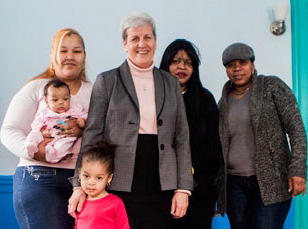
Guest Blog: Without Living Wages, Women Face Instability
Sister Janet Kinney, CSJ
May 12, 2016
As the Executive Director of Providence House – a Brooklyn nonprofit providing transitional and supportive housing to formerly incarcerated women and homeless women and their children – I hear every day the heart wrenching stories of women struggling to make ends meet, and their searches for suitable employment that will help them care for their children and get back on their feet. Each of them desperately wants to return to the mainstream of life, living in their own apartments. Time and again the frustrations they express are very real – because the wages they receive for the hours they work, just don’t match up to the cost of living here in New York City.
Stories like Marisa’s, a 35-year-old Hispanic woman with a three-year-old daughter who entered the New York City shelter system in September 2015 due to domestic violence abuse. Prior to moving to Providence House she had been working for five years in a bookstore as a barista. In those five years her wage crept up to a mere $9.50/hour. Before taxes this would equate to an income of $1,520/month: barely enough rent for a one bedroom apartment. Add utility costs, food costs, and general living expenses, it was clear that as a single wage earner she needed to either find higher paying employment, take on a second part-time job, or do a combination of the two. Because Marisa did not have a high school diploma her options were limited. She received training as a Home Health Care Aide, and was able to add 15-25 hours of health care work at $10/hour, though the hours are inconsistent: a worry for Marisa as she tries to save while juggling these two jobs.
Then there is Thomasine, a 31-year-old African-American woman with an eight-year-old son. Thomasine is already working two jobs – one as a security guard and the other as a waitress in a restaurant. Her combined income from these two jobs barely hits $1,500/month before taxes. She has now resided in our shelter for two years.
Mary Lou, age 34, a white woman with two children has lived at Providence House just over a year. She is a delivery supervisor at a restaurant, earning $11.25/hour, with a before taxes monthly income of $1,800. Mary Lou is working hard to save her money for the security deposit and first month’s rent of a two bedroom apartment – which range from $1,500-$1,800/month – but again, it is an upward battle.
The economic divide here in New York crosses racial lines, although people of color are disproportionately affected. In New York the minimum wage has just been raised to $9.00/hour and both the mayor and governor are challenging the legislature to adopt a $15.00/hour minimum wage phased in over three years. Across the country, the federal minimum wage is even lower, only $7.25/hour.
Fighting for a living wage is more complicated than simply raising the hourly minimum wage. Workers today face multiple challenges, such as employers increasing part time and contract work, receiving different wages for tipped work, and decreasing benefits.
Living wages also depend on having access to affordable housing and maintaining savings. There was a time when ‘the norm’ was an individual or family dedicating 30 percent of their income to rent, which allowed them to not only pay for other living costs (food, utilities, clothing, medical, transportation) but also contribute to a savings account or pursue further education. The women I work with will be lucky if two-thirds (67 percent) of their income is dedicated to rent. Savings become difficult, if not impossible, so even when one of our group of women can earn enough to afford her own apartment, without savings, she lives on the precipice of future homelessness if any part of her fragile income stream falters.
Living wages ensure workers can care for themselves and their families and meet their housing, nutrition, health, and other needs regardless of where they live. A minimum wage is not enough; we must have living wages.
Sister Janet Kinney, CSJ is the Executive Director of Providence House in Brooklyn, New York, www.providencehouse.org
This story originally appeared in NETWORK’s Connection magazine. See the full issue here.







